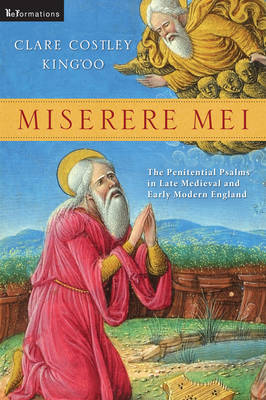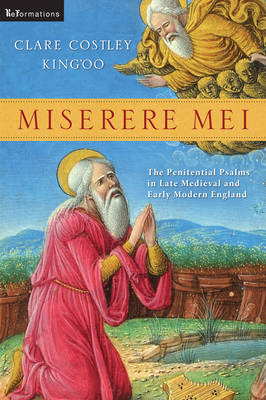
- Retrait gratuit dans votre magasin Club
- 7.000.000 titres dans notre catalogue
- Payer en toute sécurité
- Toujours un magasin près de chez vous
- Retrait gratuit dans votre magasin Club
- 7.000.0000 titres dans notre catalogue
- Payer en toute sécurité
- Toujours un magasin près de chez vous
Description
In Miserere Mei, Clare Costley King'oo examines the critical importance of the Penitential Psalms in England between the end of the fourteenth and the beginning of the seventeenth century. During this period, the Penitential Psalms inspired an enormous amount of creative and intellectual work: in addition to being copied and illustrated in Books of Hours and other prayer books, they were expounded in commentaries, imitated in vernacular translations and paraphrases, rendered into lyric poetry, and even modified for singing. Miserere Mei explores these numerous transformations in materiality and genre. Combining the resources of close literary analysis with those of the history of the book, it reveals not only that the Penitential Psalms lay at the heart of Reformation-age debates over the nature of repentance, but also, and more significantly, that they constituted a site of theological, political, artistic, and poetic engagement across the many polarities that are often said to separate late medieval from early modern culture.
Miserere Mei features twenty-five illustrations and provides new analyses of works based on the Penitential Psalms by several key writers of the time, including Richard Maidstone, Thomas Brampton, John Fisher, Martin Luther, Sir Thomas Wyatt, George Gascoigne, Sir John Harington, and Richard Verstegan. It will be of value to anyone interested in the interpretation, adaptation, and appropriation of biblical literature; the development of religious plurality in the West; the emergence of modernity; and the periodization of Western culture. Students and scholars in the fields of literature, religion, history, art history, and the history of material texts will find Miserere Mei particularly instructive and compelling.
Spécifications
Parties prenantes
- Auteur(s) :
- Editeur:
Contenu
- Nombre de pages :
- 306
- Langue:
- Anglais
- Collection :
Caractéristiques
- EAN:
- 9780268033248
- Date de parution :
- 31-05-12
- Format:
- Livre broché
- Format numérique:
- Trade paperback (VS)
- Dimensions :
- 150 mm x 229 mm
- Poids :
- 498 g

Les avis
Nous publions uniquement les avis qui respectent les conditions requises. Consultez nos conditions pour les avis.






